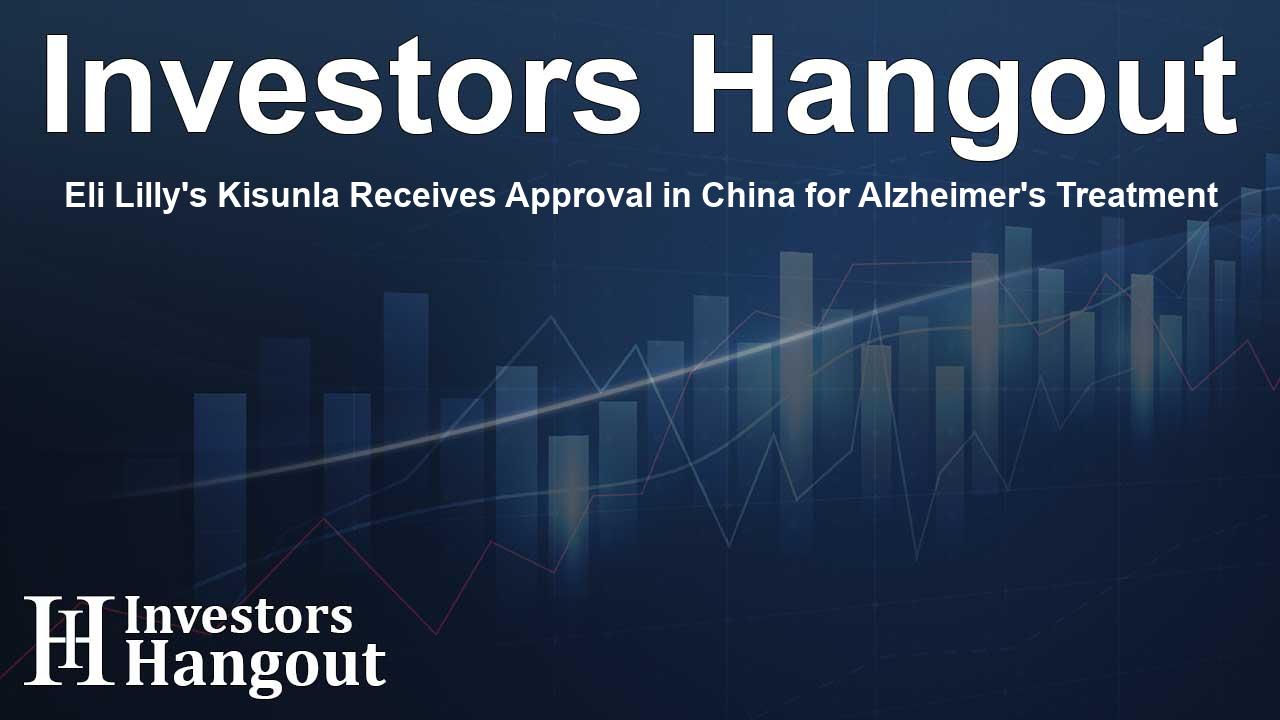Eli Lilly's Kisunla Receives Approval in China for Alzheimer's Treatment

Eli Lilly's Kisunla Secures Approval in China
Eli Lilly and Company (NYSE: LLY) has recently marked a significant milestone by securing approval from China's National Medical Products Administration (NMPA) for Kisunla™ (donanemab-azbt). This marks a pivotal expansion for the pharmaceutical titan as it's the fourth major market endorsement for this innovative treatment dedicated to Alzheimer’s disease, following approvals in the United States, Japan, and Great Britain.
Understanding Kisunla and Its Impact
Kisunla is developed specifically for treating adults exhibiting early symptoms of Alzheimer’s, which includes patients diagnosed with mild cognitive impairment (MCI) and early dementia with confirmed amyloid pathology. This focus is particularly pertinent as Alzheimer's continues to pose a significant healthcare challenge, notably in regions where elderly populations are more prevalent.
Alzheimer's Disease in China
Alzheimer's affects nearly 6% of the population over the age of 65 in China, with projections indicating that this figure could escalate to 11% by 2050. The introduction of Kisunla presents a new therapeutic avenue for managing Alzheimer's disease by targeting amyloid plaque formation in the brain, thus potentially altering the course of treatment for numerous patients.
Clinical Trial Successes
The approval of Kisunla was largely supported by results from the TRAILBLAZER-ALZ 2 Phase 3 clinical trial. This comprehensive study demonstrated that patients who were treated with Kisunla experienced a 35% slower decline in cognitive function and daily activities compared to those receiving a placebo. Moreover, the drug showed remarkable efficacy in reducing amyloid plaques—indicating a potential restoration of cognitive abilities for patients who may have felt hopeless until now.
Addressing Side Effects
Like any medical intervention, Kisunla is not without its risks. Patients may experience amyloid-related imaging abnormalities (ARIA), which could entail temporary brain swelling or minor bleeding. Despite this, it is crucial to note that ARIA often manifests symptom-free and can be effectively monitored through regular MRI scans, ensuring patient safety during treatment.
Dosing and Treatment Regimen
Kisunla is administered intravenously every four weeks. This scheduled treatment not only allows for potential cost savings associated with reduced infusion frequency but also offers hope for discontinuing treatment once amyloid plaques have been cleared from the brain.
Expanding Eli Lilly's Market Presence
The recent approval of Kisunla is a robust endorsement of Eli Lilly's commitment to addressing the complexities of Alzheimer’s disease, particularly amid a rapidly growing patient population. The global pharmaceutical landscape is continuously evolving, and Eli Lilly appears poised to capitalize on these market opportunities, further enhancing its extensive portfolio.
Recent Collaborations and Developments
In addition to the landmark approval for Kisunla, Eli Lilly made headlines with its collaboration with Innovent Biologics, which now holds exclusive rights to market and distribute Lilly's cancer treatment, Jaypirca®, in China. This partnership is a significant step towards addressing urgent clinical needs within hematologic cancers.
On another front, Eli Lilly's weight loss solution, Manjaro, continues to grow in popularity, surpassing Novo Nordisk's Wegovy in the UK market. This success highlights the evolving dynamics within the obesity treatment sector, where analysts are projecting substantial growth, possibly reaching over $95 billion by 2030.
Moreover, the company is on the brink of receiving approval for its Crohn's disease treatment, Omvoh, which is under review by the European Medicines Agency. These strategic movements showcase Eli Lilly's proactive approach in tackling diverse health issues while reinforcing its position in the global pharmaceutical market.
Frequently Asked Questions
What is Kisunla used for?
Kisunla is designed to treat adults with early symptomatic Alzheimer's disease, including individuals with mild cognitive impairment and early dementia stages.
How does Kisunla work?
Kisunla works by targeting the accumulation of amyloid plaques in the brain, which are associated with the progression of Alzheimer's disease.
What are the side effects of Kisunla?
Potential side effects may include amyloid-related imaging abnormalities (ARIA) such as temporary brain swelling, although many patients may not experience symptoms.
How often is Kisunla administered?
Kisunla is administered via intravenous infusion every four weeks, with the possibility of treatment discontinuation once amyloid plaques are removed.
What other recent developments has Eli Lilly announced?
Eli Lilly has recently partnered with Innovent Biologics to distribute the cancer drug Jaypirca® in China, and its weight loss drug Manjaro is gaining market traction over competitors.
About Investors Hangout
Investors Hangout is a leading online stock forum for financial discussion and learning, offering a wide range of free tools and resources. It draws in traders of all levels, who exchange market knowledge, investigate trading tactics, and keep an eye on industry developments in real time. Featuring financial articles, stock message boards, quotes, charts, company profiles, and live news updates. Through cooperative learning and a wealth of informational resources, it helps users from novices creating their first portfolios to experts honing their techniques. Join Investors Hangout today: https://investorshangout.com/
Disclaimer: The content of this article is solely for general informational purposes only; it does not represent legal, financial, or investment advice. Investors Hangout does not offer financial advice; the author is not a licensed financial advisor. Consult a qualified advisor before making any financial or investment decisions based on this article. The author's interpretation of publicly available data shapes the opinions presented here; as a result, they should not be taken as advice to purchase, sell, or hold any securities mentioned or any other investments. The author does not guarantee the accuracy, completeness, or timeliness of any material, providing it "as is." Information and market conditions may change; past performance is not indicative of future outcomes. If any of the material offered here is inaccurate, please contact us for corrections.